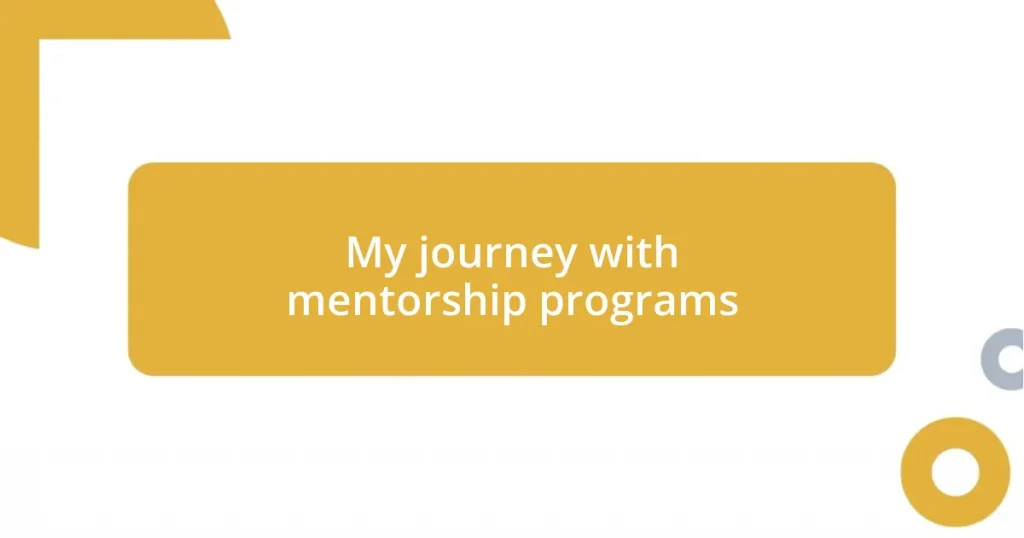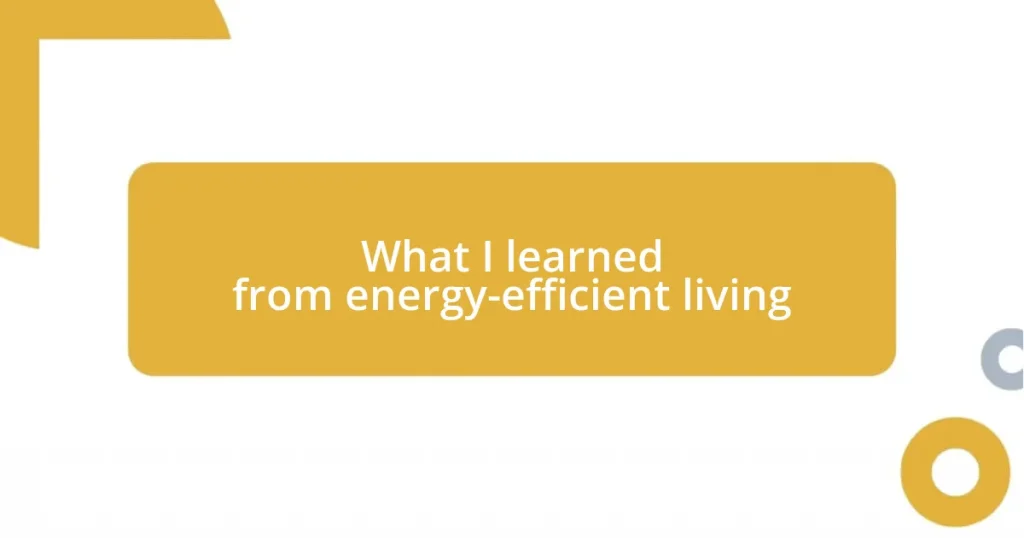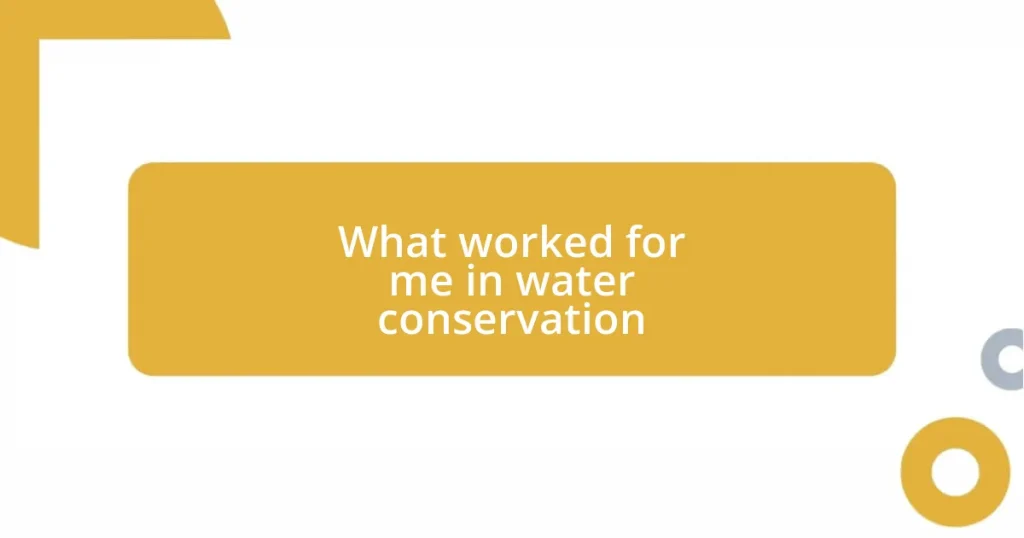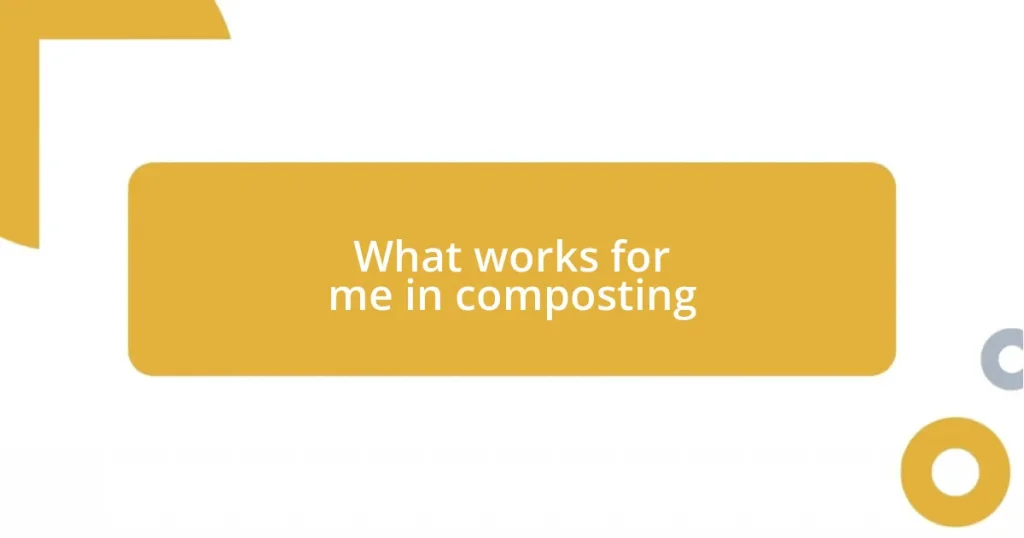Key takeaways:
- Mentorship fosters a reciprocal learning environment, enhancing growth for both mentor and mentee through shared experiences.
- Setting clear, specific, and measurable goals is crucial for effective mentorship and ensures both parties maintain focus and direction.
- Embracing constructive criticism and adapting communication styles strengthens the mentor-mentee relationship and fosters personal development.
- Post-mentorship, maintaining connections and setting new goals based on learned insights are vital for continued growth and professional success.

Understanding mentorship programs
Mentorship programs serve as structured partnerships where experienced individuals, known as mentors, guide those who are newer in a particular field or discipline. I remember my first mentorship experience vividly; I was nervous yet excited about being paired with someone whose career I admired. It made me reflect on how valuable it is to have someone believe in your potential, inviting questions like, “What could I achieve with the right guidance?”
These programs often encompass components such as one-on-one meetings, goal setting, and skill development, creating a nurturing environment for growth. For instance, during my journey, my mentor helped me navigate a challenging project by not just offering solutions but encouraging me to think critically and develop my own problem-solving strategies. It hit me then—how often do we miss opportunities for self-discovery when someone simply hands us the answers?
Furthermore, a key element of mentorship is the reciprocity it fosters. While I gained knowledge, I also found that sharing my thoughts and perspectives enriched my mentor’s experience. Have you ever noticed how meaningful conversations can shift our outlook? It was during one such exchange that I realized mentorship is not just about teaching; it’s about learning together and evolving through those shared experiences.

Benefits of mentorship experiences
Mentorship experiences bring a wealth of benefits that can profoundly impact one’s career and personal development. I’ll never forget the moment my mentor introduced me to a broader professional network. Suddenly, I was not just another participant in my field; I was part of a community that felt both encouraging and empowering. Have you ever been in a room where the collective knowledge is palpable? That feeling is incredibly motivating, and it often leads to new opportunities I hadn’t even anticipated.
Additionally, mentorship provides a safe space for vulnerability and growth. During my time with my mentor, there were moments of self-doubt when I questioned my abilities and choices. However, having someone to share those fears with transformed my perspective. I realized that mentors not only invest in your skills but also nurture your confidence. It’s a reminder that even in our most uncertain times, support exists if we open ourselves up to the experience.
Lastly, the reflective process instilled by mentorship encourages self-awareness, which is often overlooked. I learned that asking myself tough questions is vital for growth. My mentor would challenge me by saying, “What do you really want out of this experience?” As I dug deeper into my ambitions, I discovered goals I didn’t even know I had. This level of introspection led to actionable steps toward achieving them. It’s fascinating how guidance can illuminate paths previously shrouded in uncertainty.
| Benefit | Description |
|---|---|
| Network Expansion | Access to a broader community and new opportunities. |
| Confidence Building | Support fosters self-esteem and resilience during challenges. |
| Self-Awareness | Encourages deep reflection on personal goals and aspirations. |
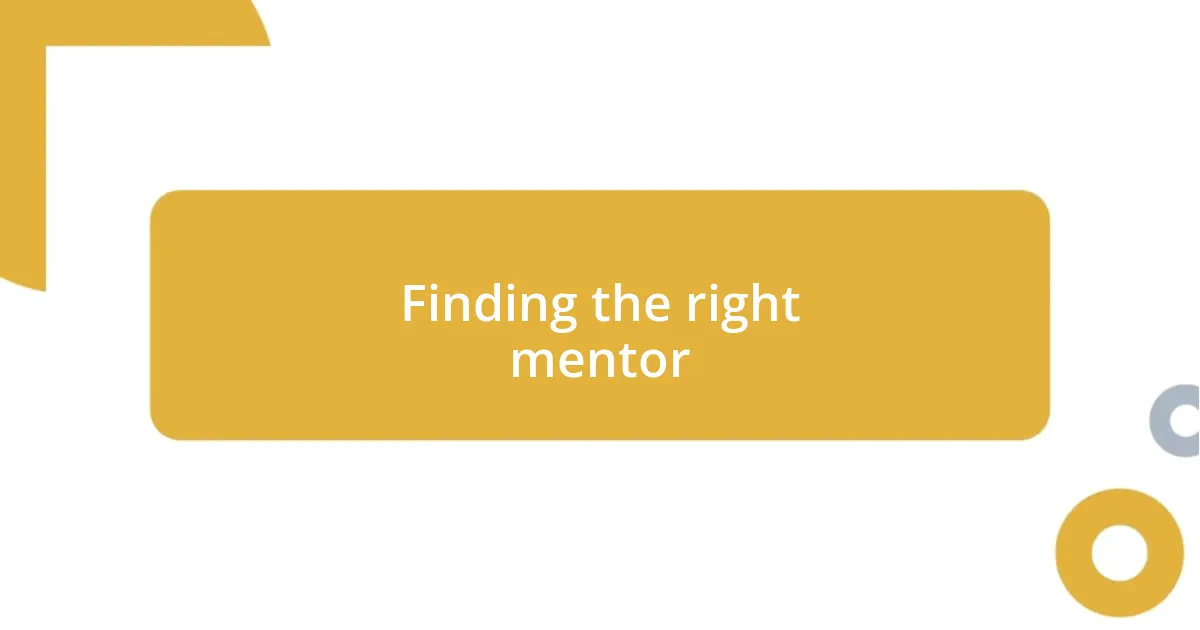
Finding the right mentor
Finding the right mentor can sometimes feel like searching for a needle in a haystack. I’ve been fortunate to connect with individuals who aligned with my aspirations, yet I’ve also experienced mismatched partnerships that taught me valuable lessons. It’s crucial, from the outset, to reflect on what you truly want from a mentorship relationship—whether it’s honing your skills, expanding your network, or gaining industry insights.
Here are some key factors to consider when looking for a mentor:
- Shared Values: Look for someone whose values resonate with yours. This common ground fosters a more authentic connection.
- Relevant Experience: Seek mentors who have navigated the paths you wish to explore. Their firsthand knowledge can provide invaluable guidance.
- Approachability: A mentor should be someone you feel comfortable reaching out to, whether it’s for advice or simply a chat.
- Chemistry: Sometimes, the best connections are intuitive. Trust your instincts—if the connection feels right, it probably is.
In my journey, I recall a moment when I met a potential mentor at a networking event. I felt an immediate spark during our conversation; it was as if we spoke the same language regarding our passions. That energy was not just about professional alignment—it was about mutual enthusiasm for growth and learning. Finding that right fit made me realize how integral the mentor-mentee relationship can be. After all, it’s not just about expertise; it’s about building a supportive partnership that empowers both parties.

Setting goals in mentorship
Setting clear goals in mentorship is essential for ensuring that both the mentor and mentee are on the same page. I remember setting my first mentorship goals like it was yesterday; I jotted down what I hoped to achieve on a piece of paper. What I realized through this exercise was that clarity provided direction and focus. Without defining goals, it can be easy to drift aimlessly, wasting valuable time and energy.
As I refined my goals over time, I learned the importance of making them specific and measurable. For instance, instead of vaguely stating, “I want to improve my public speaking skills,” I set a concrete goal to present at least three times at community events within six months. This not only added structure to my mentorship journey but also gave my mentor a tangible target to help me work towards. Have you ever noticed how specific goals can transform your approach towards challenges?
Being open to revisiting and adjusting goals is another lesson I picked up during my mentorship experiences. There was a phase when I realized my initial objectives no longer aligned with my evolving interests. When I shared this with my mentor, we collaboratively reassessed my goals, which led to discovering new avenues I hadn’t previously considered. This adaptability not only strengthened our bond but also made the mentorship feel more relevant and dynamic. Isn’t it intriguing how fluidity in goals can enhance growth and engagement?
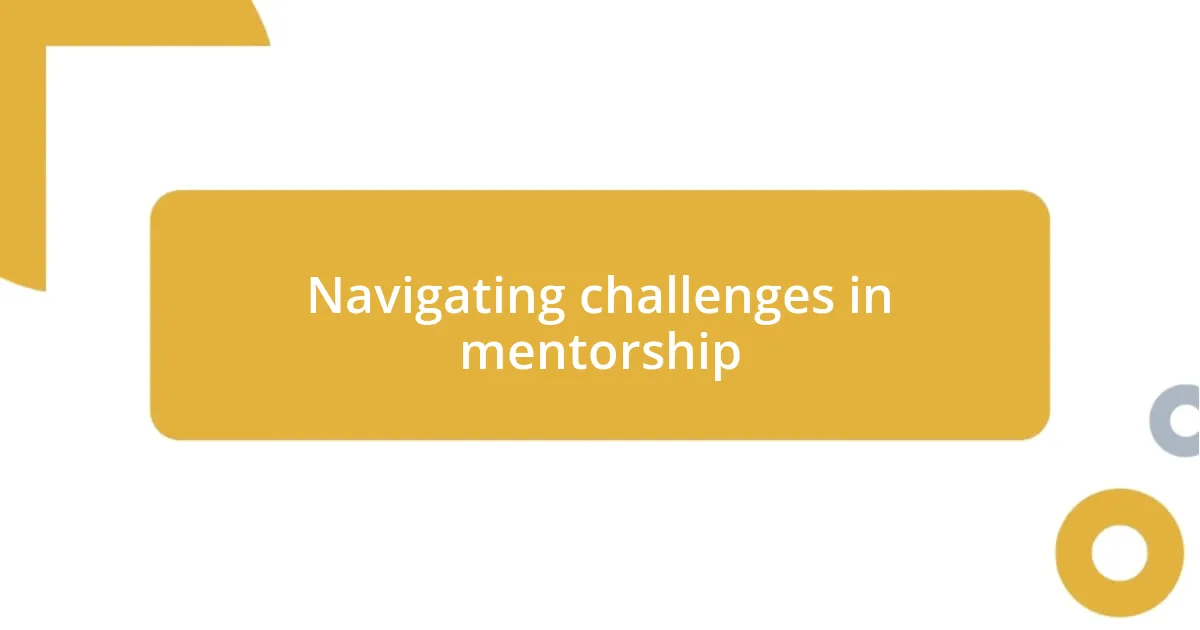
Navigating challenges in mentorship
Navigating challenges in mentorship often requires a keen awareness of communication styles. Early in my journey, I faced a significant hurdle when my mentor and I had vastly different approaches. While I thrived on detailed discussions and brainstorming sessions, they preferred to provide succinct feedback, leaving me wanting more. Over time, I learned the art of adapting my communication to ensure our exchanges were effective and enjoyable. Have you ever found yourself misaligned with someone when it comes to discussing ideas? I did, and it highlighted the beauty and complexity of mentorship.
One of the toughest challenges I’ve encountered was accepting constructive criticism. There was a time when my mentor pointed out areas for improvement in my work, and my initial reaction was defensive. It took me a while to realize that this feedback was not a personal attack but rather a tool for growth. Embracing this perspective allowed me to foster a more productive relationship with my mentor, turning potential conflict into collaboration. I’ve found it essential to approach feedback with an open mind. How do you manage criticism?
Furthermore, time management can pose another significant challenge in mentorship dynamics. I recall periods where our sessions were often rushed, leaving me feeling undervalued and unprepared. In those moments, I began to emphasize the importance of dedicated time—planning meetings well in advance and creating an agenda. This proactive approach not only transformed our interactions but also made every session more enriching and focused. Have you ever felt that the time spent with a mentor was just skimming the surface? I did, and it was a pivotal lesson on the value of structure in mentorship.

Measuring mentorship success
To gauge the success of a mentorship program, it’s crucial to establish specific metrics tailored to the unique goals of both parties. I remember, after a few months of collaboration, creating a checklist of achievements with my mentor. Each item checked off became a little victory, reinforcing my motivation. Isn’t it amazing how celebrating small wins can uplift our spirits during the grind?
Another effective way I measured success was through regular feedback sessions. During one of these sessions, I asked my mentor how well I was adapting to the insights shared. The honest feedback he provided made me reflect deeply on my progress and areas needing improvement. It created a safe space for growth that I truly valued. Have you ever asked for feedback and found it enlightening? I certainly did, and it changed the trajectory of my mentorship experience.
Lastly, I found that documenting my personal growth was instrumental in understanding the broader impact of the mentorship. At the end of each month, I would take a moment to jot down my reflections in a journal. These entries not only served as a benchmark but also became a source of inspiration during tougher times. Looking back, I could see how far I’d come, which was incredibly rewarding. Isn’t it fascinating how documentation can illuminate our journey?

Next steps after mentorship
Once mentorship wraps up, it’s time to put what you’ve learned into action. I remember feeling a mix of excitement and anxiety when I had to step out of my mentor’s shadows and apply the insights I gained. For instance, I took on a challenging project at work that pushed me beyond my comfort zone. It was a bit daunting—have you ever felt that thrill when diving into the unknown? That adrenaline rush reminded me that every lesson learned was a tool to navigate new challenges.
Networking and maintaining relationships with mentors can also be an essential next step. After my mentorship ended, I made a conscious effort to stay in touch. By sending occasional updates about my progress or sharing relevant articles, I ensured that our connection remained alive and fruitful. Have you nurtured your professional relationships after a significant chapter closed? Reflecting on those interactions makes me realize how mentorship doesn’t just end; it evolves.
Lastly, I found that setting new goals in light of my mentoring experience was paramount. It’s one thing to learn; it’s another to apply that knowledge strategically. I began crafting a detailed career plan, and, interestingly, it included milestones that stemmed directly from my discussions with my mentor. How often do we fail to map out our paths after gaining new insights? Creating a clear roadmap transformed my uncertainty into clarity and purpose, guiding each step forward with confidence.










